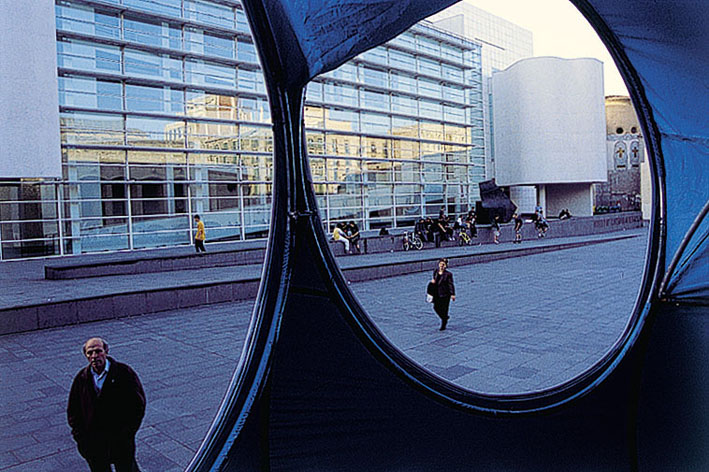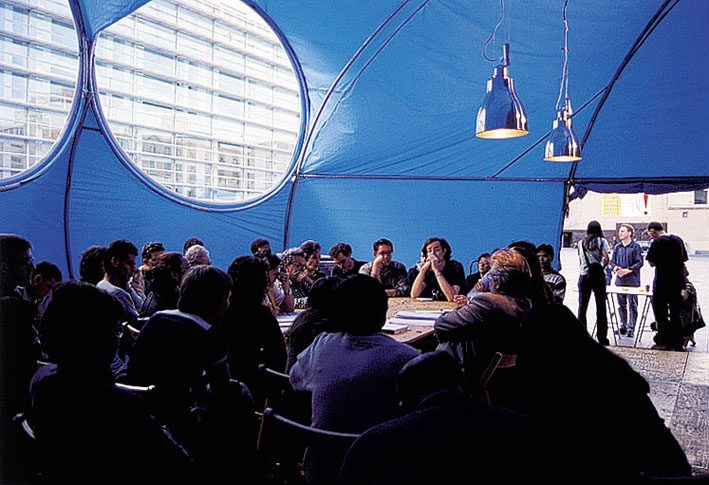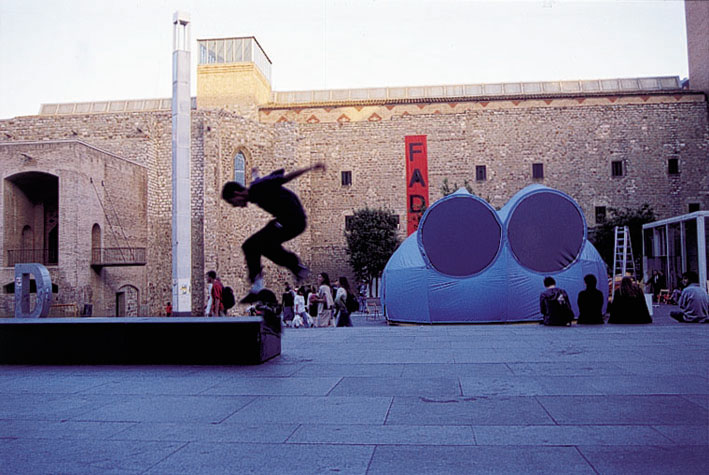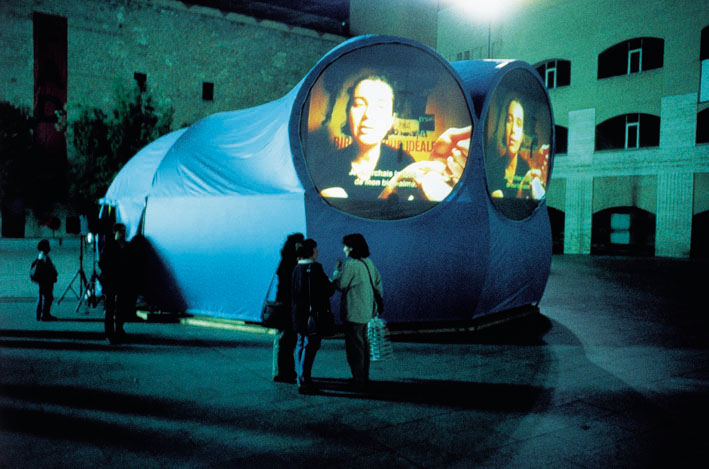Barcelona , 2000
LONELINESS IN THE CITY
A group was formed consisting of artists, architects, designers and neighbours. They worked with the word ‘remix,’ mixing problems, cultures, dreams and differences.
TRAVELLING PROJECT:
CBK DORDRECHT
MUSEUM ABTEIBERG, MÖNCHENGLADBACH
MACBA, BARCELONA
KIASMA, HELSINKI
MIGROS MUSEUM, ZURICH
Donated to the collection of NMAC Montenmedio, Cádiz
In Barcelona a group was formed consisting of artists, architects, designers and neighbours. They worked with the word ‘remix,’ mixing problems, cultures, dreams and differences. Enriching and complex possibilities were offered to the inhabitants of the diverse neighborhood of Moroccans, Catalans, Filipinos and Pakistanis.
Loneliness in the City is a long-term research project about loneliness in modern urban life. For a number of years this theme played an important role in the work of Alicia Framis and has been elaborated on in several different forms.
For Loneliness in the City Framis collaborated with the artist Dré Wapenaar to design a mobile platform as the a-topical place where artists, architects and the public could develop and exchange ideas. The oval-shaped pavilion or tent of approximately 12×9 metres contains five sleeping cabins for the participants; the rest of the tent is public space. The pavilion is a research laboratory where ideas are investigated and immediately tested in reality. At the same time it is a community space to meet and relax. An intensive programme of workshops, performances, special video programmes, music and interactive events was organized for each city, to tie in with local issues and participants.
From Mönchengladbach to Dordrecht, to Barcelona, Helsinki and Zurich, insight into the general causes and corners of loneliness gradually grew and alternative strategies for interaction between people in the city were devised.
The programme in Dordrecht concentrated on creating a-topical places – places that do not have a preconceived or predefined function or purpose. The workshops ended up focusing on conquering or claiming space. A public place can become private or intimate by giving it new functions or meanings; conversely, a formerly private space can become a public one.
Guests:
Zoubida Bouzidi/Morroco, Spain
Neus Buita/artist Spain
Nuria Canal/artist Spain
Jordi Encinas/skateboarder Spain
Albert Folch/designer Switzerland, Spain
GAT/composer Spain
Gustavo Gili Galfetti/architect Spain
Ana Guiterez/masseuse Spain
Una Henry/artist Ireland, Holland
Eugenio Madueno/journalist Spain
Mont Marsa/designer Spain
Rossend Mateu/perfume maker Spain
Joseph M.Martin/artist Spain
Sergi Olivares/photographer Spain
Ignasi Perez Arnal/Actar architect Spain
Alberto Peral/artist Spain
Bas Princen/artist Holland
Professor Angel Dust/d.j.Spain
Julia Schulz-Domburg/architect Germany. Spain
Toni Serra/artist Spain
Sabine Steinhof/interior designer Germany




In Barcelona a group was formed consisting of artists, architects, designers and neighbours. They worked with the word ‘remix,’ mixing problems, cultures, dreams and differences. Enriching and complex possibilities were offered to the inhabitants of the diverse neighborhood of Moroccans, Catalans, Filipinos and Pakistanis.
Loneliness in the City is a long-term research project about loneliness in modern urban life. For a number of years this theme played an important role in the work of Alicia Framis and has been elaborated on in several different forms.
For Loneliness in the City Framis collaborated with the artist Dré Wapenaar to design a mobile platform as the a-topical place where artists, architects and the public could develop and exchange ideas. The oval-shaped pavilion or tent of approximately 12×9 metres contains five sleeping cabins for the participants; the rest of the tent is public space. The pavilion is a research laboratory where ideas are investigated and immediately tested in reality. At the same time it is a community space to meet and relax. An intensive programme of workshops, performances, special video programmes, music and interactive events was organized for each city, to tie in with local issues and participants.
From Mönchengladbach to Dordrecht, to Barcelona, Helsinki and Zurich, insight into the general causes and corners of loneliness gradually grew and alternative strategies for interaction between people in the city were devised.
The programme in Dordrecht concentrated on creating a-topical places – places that do not have a preconceived or predefined function or purpose. The workshops ended up focusing on conquering or claiming space. A public place can become private or intimate by giving it new functions or meanings; conversely, a formerly private space can become a public one.
Guests:
Zoubida Bouzidi/Morroco, Spain
Neus Buita/artist Spain
Nuria Canal/artist Spain
Jordi Encinas/skateboarder Spain
Albert Folch/designer Switzerland, Spain
GAT/composer Spain
Gustavo Gili Galfetti/architect Spain
Ana Guiterez/masseuse Spain
Una Henry/artist Ireland, Holland
Eugenio Madueno/journalist Spain
Mont Marsa/designer Spain
Rossend Mateu/perfume maker Spain
Joseph M.Martin/artist Spain
Sergi Olivares/photographer Spain
Ignasi Perez Arnal/Actar architect Spain
Alberto Peral/artist Spain
Bas Princen/artist Holland
Professor Angel Dust/d.j.Spain
Julia Schulz-Domburg/architect Germany. Spain
Toni Serra/artist Spain
Sabine Steinhof/interior designer Germany